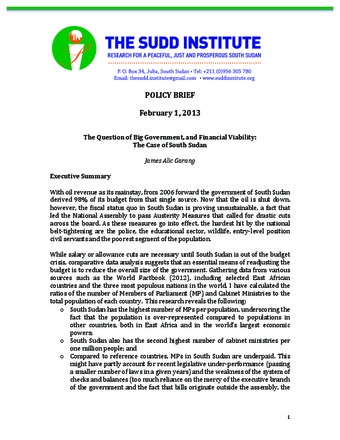The Question of Big Government, and Financial Viability: The Case of South Sudan
Publication Summary
With oil revenue as its mainstay, from 2006 forward the government of South Sudan derived 98% of its budget from that single source. Now that the oil is shut down, however, the fiscal status quo in South Sudan is proving unsustainable, a fact that led the National Assembly to pass Austerity Measures that called for drastic cuts across the board. As these measures go into effect, the hardest hit by the national belt-tightening are the police, the educational sector, wildlife, entry-level position civil servants and the poorest segment of the population.
While salary or allowance cuts are necessary until South Sudan is out of the budget crisis, comparative data analysis suggests that an essential means of readjusting the budget is to reduce the overall size of the government. Gathering data from various sources such as the World Factbook (2012), including selected East African countries and the three most populous nations in the world, I have calculated the ratios of the number of Members of Parliament (MP) and Cabinet Ministries to the total population of each country. This research reveals the following:
- South Sudan has the highest number of MPs per population, underscoring the fact that the population is over-represented compared to populations in other countries, both in East Africa and in the world’s largest economic powers;
- South Sudan also has the second highest number of cabinet ministries per one million people; and
- Compared to reference countries, MPs in South Sudan are underpaid. This might have partly account for recent legislative under-performance (passing a smaller number of laws in a given years) and the weakness of the system of checks and balances (too much reliance on the mercy of the executive branch of the government and the fact that bills originate outside the assembly, the process which is plagued by the delays by Ministry of Justice and Council of Ministers).
Since there is no such a thing as free lunch, large government—when measured by the size of its parliament and cabinet ministries—imposes a fiscal burden on the country in terms of huge governmental wage bills (Gallaway & Vedder, 1998). In calling for reducing the size of the government of South Sudan, this paper is an argument for safeguarding the nation’s financial viability, with the following policy actions specifically recommended:
- Reduce the size of South Sudan Bicameral Parliament to 170 MPs;
- Reduce the number of federal ministries to 20, thus clamping down on government wage bills and enhancing savings;
- Channel these realized savings as transfers to states to create employment and enhance social programs, and alternatively,
- Raise the annual pay of MPs to US$ 60,000. Given that their present pay is the lowest in the region, a pay rise may improve representative’s work morale.
Since South Sudan has the largest government in the region, a reduction comes with two additional advantages: 1) the freeing of resources for other pressing development needs, and 2) the saving of the nation from a debt crisis down the road. These savings will be used to support the increase in MP salaries as well as the development of social programs and employment opportunities in the ten states. These investments in the people of South Sudan can enhance the spread of peace and security in the country. This paper’s objective is thus in line with that of The Sudd Institute, whose primary goal is a ‘research for a peaceful, just and prosperous South Sudan.’
James Alic Garang is a co-founder and scholar at The Sudd Institute. His areas of interest include macroeconomics, development economics, financial sector, and financial inclusion. He has in the past participated in host of academic and professional undertakings, including internships at the African Development Bank in Tunisia (2009-2010), as a lead evaluator on the Banking Sector during the “Comprehensive Evaluation of the Government of South Sudan, 2006-2010”, a consultant with the World Bank (2013-2014), and a board member serving on a number of charitable organizations and academic affiliations. A former McNair Scholar, and a member of Omicron Delta Epsilon, James holds a PhD in Economics from the University of Massachusetts, Amherst. A former Deputy Dean of Faculty of Economic & Social Studies at Upper Nile University and a Senior Economist with the Ebony Center for Strategic Studies, he is currently a Senior Advisor to the Executive Director at the IMF Executive Board in Washington, DC.

